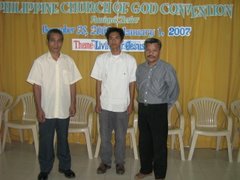Christianity is a singing religion. The coming of Jesus was ushered in with the joyful chants of the heavenly throng. Singing has ever been a prominent part of the worship of God. When the soul has a vision of the God revealed in the New Testament it is uplifted, illuminated, inspired, exalted. This exaltation naturally bursts forth into heavenly songs—songs of joy and true happiness.
The vast wealth of song written by Christians and used in their religious devotions is in a strange and almost startling contrast to the lack of song in the other religions of the world. Music has little part in the worship of other systems of religion. The American Indian may sing his war song, song of the chase, or other similar songs in his religious festivals. The votaries of other religions may also sing songs, but these are generally not songs of worship but songs to placate their gods, rather than attempts to express their own joyfulness in the service of their gods. It is true that Buddhism in some countries is borrowing the Christian custom of song in worship and adapting Christian hymns to their worship. It should be noted, however, that this is a mere adaptation in the face of Christian competition rather than something that originated in Buddhism. So Christianity may be said to be the only singing religion including, of course, the worship of Israel, from which it has in a great measure been derived.
Religion has a powerful influence upon happiness. It adds much to or takes much from natural happiness, according to the kind of religion in which we believe. Christians do not all believe in the same sort of religion. True, they all believe in one God, and in one Bible, and in a general way in many of the same things. When we come to the practical side of religion, however, there are about five kinds of the Christian religion. Four of these produce little happiness, in fact may hinder happiness. They may stifle the song that would naturally arise from the free heart. The reader will do well to pause and consider as we notice these five kinds of religion—which, if any, he has, or if he has a mixture of them.
RELIGION OF SELF-DENIAL
First, there is the don't religion. It is the religion of self-denial. It is hedged in with numerous restrictions. It is a religion in which the worshiper is kept in a straight jacket. It is largely a negative religion. Those having this religion may be very strict, very sincere, very earnest, but they never can be truly happy. Happiness never comes from the purely negative aspect of life. When we deny ourselves anything in religion the purpose should not be merely that we be without it, but that we may put in its place something greater, something that will contribute more to our happiness and well-being. Religion is intended to make people free, with the highest type of freedom. "If the Son therefore shall make you free, ye shall be free indeed," is the slogan of the New Testament. A don't religion is conducive to bondage. There is a sort of satisfaction in this don't religion. It may gratify the sense of duty, but we must get a different sort of religion in order to know the secret of the singing heart.
RELIGION OF WORKS
The second kind of religion is the do religion. It consists of merely following forms and ceremonies, or obeying rules and regulations, or doing works of merit. Its followers may find considerable satisfaction in reading prayers, bowing down and arising, in making the sign of the cross, in keeping holy days, making pilgrimages in closely following outlined ceremonials and going through forms. Some of the forms of religion have a certain value in giving soul uplift, but they are a poor substitute for the realities of true religion. With this formalism there may be stately singing by trained choirs, there may be grand organs pealing forth, there may be intellectual discoursing, with the heart of genuine religion absent. The esthetic sense is gratified while the soul is left unfed or perhaps impoverished. This do religion trusts in works. It draws much satisfaction from what it has done. There was much of this sort of religion among the old Pharisees. But who ever saw a Pharisee who was truly happy, whose heart sang with joy? No, a religion of mere works, of forms and ceremonies, can bring little true happiness.
RELIGION OF THE LAW
Another form of religion is the Sinai religion. It hedges in lives with "thou shalt" and "thou shalt not." It is the mere keeping of commandments. It is a worshiper of authority. It is doing because one must. It is refraining from doing for fear of punishment. The God of Sinai still thunders forth in this religion. He is a great and awful God, crowned with majesty and glory, but far removed from the worshiper. He is worshiped in fear and trembling at the foot of the mountains whose summit is hidden in angry clouds. Out of these clouds flash the lightnings of divine vengeance. It is a stiff and rigorous religion. There is little of grace or mercy in it. It is walking by rule. There is little in it to start the songs that come from a peaceful and happy heart.
RELIGION OF EMOTIONS
Then there is what may be called the slippery religion. It is one that people must hold fast with all their might lest it should slip away from them. People who have this type of religion are constantly in fear of losing it. If they do this, or that, or the other thing, they wonder, "Now, have I lost my religion?" They are always examining themselves. They are always questioning and wondering. They cannot for long settle down to certainty. They are often overwhelmed with doubts and fears. They are constantly observing their emotions to see whether or not these emotions indicate whether they still have religion or have lost it.
Perhaps they pray and earnestly try to draw near to God. Then if joy and happiness come they are satisfied and sure they have their religion. But presently a dark day comes. Their emotions subside. Then they wonder again whether they still have their religion. In reality their struggle is not to keep their religion, but to keep their emotions and to satisfy their own questionings and doubts. This religion carries them alternately to the mountain top, then to the depths of the valley of humiliation. It is truly an "up and down" religion. This slippery sort of religion can never be the source of true and lasting happiness.
NEW TESTAMENT RELIGION
The fifth and true type of religion, the religion that corresponds with the teachings of the New Testament and with the experiences of those who have learned the inner and fuller realities of religion, is that religion which is of the heart. It is not a religion of restriction, neither of formalism. It is neither Sinai religion, nor a slippery religion. It is a religion in which the heart is in its natural element. It is a religion of peace and contentment, a religion of joyful service. It is the natural expression of the soul. It is a peaceful and harmonious relation with God. It is the relation of a child and its father. Its elements are simplicity, sincerity, purity, faith, love, and all the fruits of the Spirit. It is a Spirit-filled life. All these things just mentioned are the deep sources that feed the bubbling springs of joy that flow forth in the waters of rejoicing and song.
In this sort of religion God is not a great and terrible monarch, a stern judge, a task-master; nor his laws a set of hard decrees. No, the Christian religion as seen in its true light is "good tidings of great joy to all people." It is written, "Happy is that people whose God is the Lord." With such a religion we not only can read of the joys of salvation in the Scriptures but have the experience of them in our own souls. In this sort of Christian life we do not fear God in the sense of being afraid of him. We do not tremble before him.
Godly fear becomes the equivalent of reverential love and out of divine and spiritual love flow greater joys than flow out of natural love.
TWO SIDES OF THE TRUE RELIGION
Real religion has two sides—first, the inside, the relations of the soul with God. The Scripture says, "Acquaint now thyself with him, and be at peace." That means to get acquainted with God, get on good terms with him. know his good qualities. Come into close contact and association with him. To know him thus is to be at peace with him. We must have the real inner experience of divine life in the soul and union with Christ. This is open to everyone who will seek it in God's way.
The other side of religion is the outside. There can be a true outside of religion only when there is a true inside religion. James defines the outside of religion by saying,
"Pure religion and undefiled before God and the father is this, to visit the fatherless and widows in their affliction, and to keep himself unspotted from the world" (James 1:27)
—a pure and holy inner life, a pure and blameless outer life, devoted to service and helpfulness. This is the religion that is a well-watered land, full of springs and fruitfulness. It is a land of song and cheer and of true blessedness.
This Christian life is the life of the "new song." When the Psalmist looked back upon the "horrible pit" and the "miry clay" out of which the Lord had delivered him he cried,
"He hath put a new song in my mouth" (Ps. 40:3).
The Revelator saw the great host of redeemed souls gathered before the throne of God and he said,
"I heard the voice of harpers harping with their harps: and they sung as it were a new song before the throne" (Rev. 14:2-3).
In chapter 15:3 we are told the nature of this song,
"And they sing the song of Moses, the servant of God, and the song of the Lamb."
The song of Moses was the song of Israel's deliverance from Egypt and their enemies after the crossing of the Red Sea. The song of the Lamb is the song of salvation. So the song we sing is a song of deliverance and of salvation. No wonder it is a joyful song!
The song has a special characteristic.
"No man could learn that song but the hundred and forty and four thousand, which were redeemed from the earth" (Rev. 14:3).
This company of people, represented in symbol by the "hundred and forty and four thousand," are all the redeemed of God. The song that could not be learned by others was the song that is learned only by experience, the experience of redemption and salvation through Jesus Christ. It cannot be sung by mere professors of religion, nor by formalists, nor by legalists. It breaks forth only from the hearts of those who are happy and free in Christ.
Isaiah, foreseeing this glorious age of salvation, cried,
"The ransomed of the Lord shall return, and come to Zion with songs and everlasting joy upon their heads; they shall obtain joy and gladness, and sorrow and sighing shall flee away" (Isa. 35:10).
This is the experience of those who have learned the secret of the singing heart.



















































































































No comments:
Post a Comment